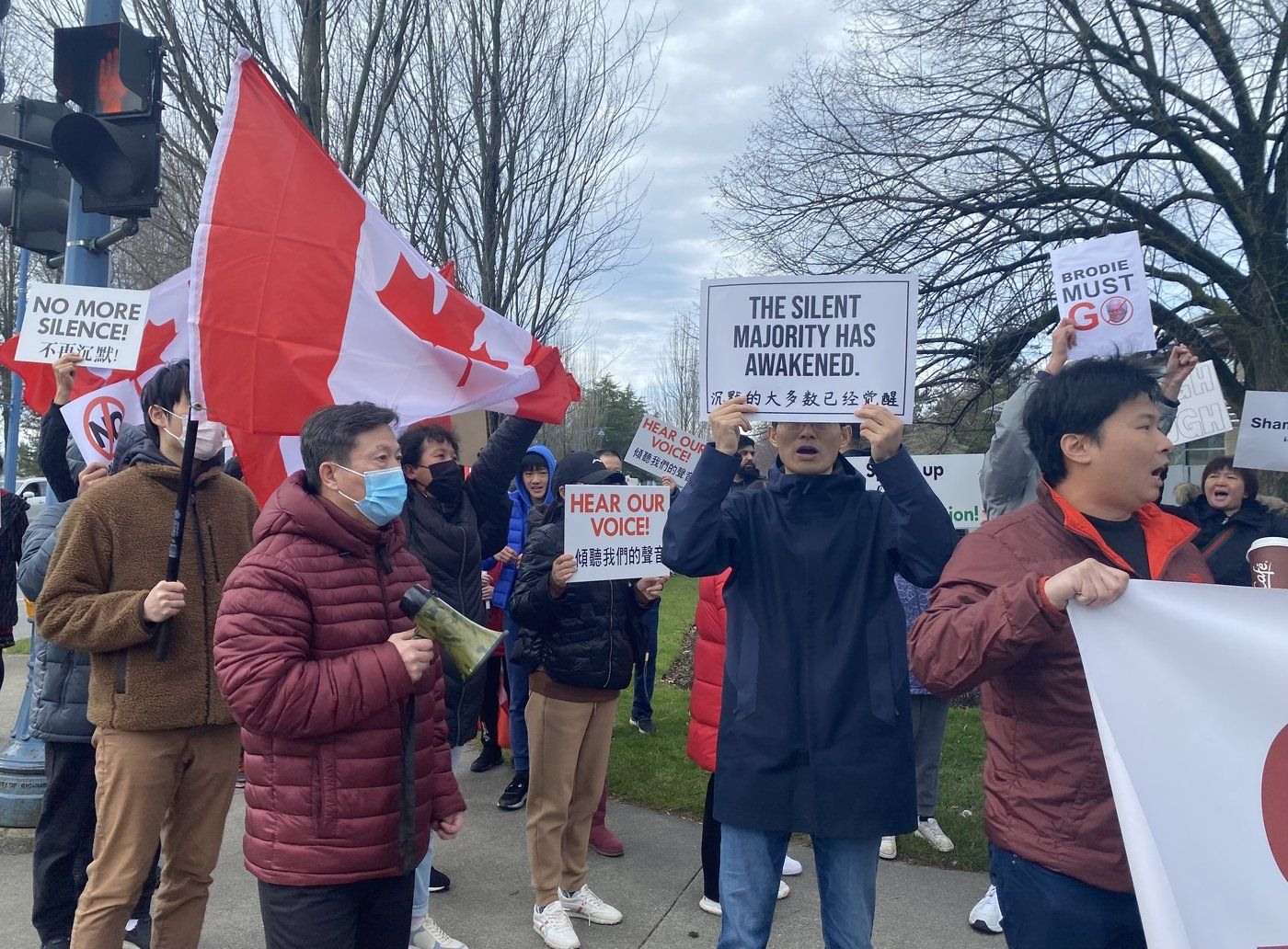Tony Li was unequivocal when asked if he had ever discussed drugs with his university-age daughter.
"It has never even crossed my mind," said Li, a resident of Richmond, B.C., who was among a large group protesting against the idea of a supervised drug consumption site in the city on Feb. 19.
"Doing drugs is a criminal act. What else is there to say?"
Plans for supervised consumption sites sometimes result in a community backlash but the response in the Metro Vancouver community of Richmond, population 210,000, has been intense and protracted, lasting long after authorities said in mid-February that a proposal to explore the idea had been scrapped.
Protesters have chanted, cheered and sobbed at city hall, marched by the hundreds and organized petitions.
Health Canada lists 46 official supervised consumption sites across the country, nine of them in B.C., operating under federal exemptions to the Controlled Drugs and Substances Act and offering places where people can use drugs in a "safe, non-judgmental environment."
It says users are provided sterile drug-use equipment, and social, medical, and mental-health services, and that the sites prevent overdoses and the spread of diseases.
Critics of the defunct proposal point to Richmond's rate of drug deaths, which is the lowest among all health service areas in the province, according to BC Coroners Service data.
But they also consistently cite parental rights.
Richmond is the most ethnically Chinese city in Canada, but geographer and former resident Justin Tse said there is a type of identity politics at play that goes beyond race, culture or religion. Tse has studied Richmond and is the author of a forthcoming book on Chinese-speaking diaspora communities.
"It's that people seem to be interested in talking about their identity as parents," said Tse, pointing to a series of issues that have sparked intense opposition in Richmond over the years.
"And because of their identity as parents, they're opposing that which they feel might endanger their children. Their concern is that (a site) will bring drug users into the communities where the safe consumption site is. And if you think about it, that is not different from the discourse around temporary housing. It's also not different from the discourse around gambling."
On Feb. 12 and 13, Richmond City Council discussed the proposal to explore the idea of a consumption site.
More than 100 people signed up to speak, packing the public gallery — and the anger of the opposing voices caught even veteran politicians by surprise.
"I was shocked," said Richmond councillor Carol Day at the Feb. 13 meeting.
"I immediately started reaching out to everyone who wrote to mayor and council, and I provided them data like the crime statistics … And I got back unbelievable emails. 'Oh, you support this, you're a drug dealer.' Really?"
Day said online messages from opponents of the idea were akin to battle cries, railing against a "Richmond injection house" and calling for "strangling the proposal in the cradle."
The proposal was passed by the council, but the next day, Vancouver Coastal Health announced a site was not under consideration, noting a comparatively low rate of drug toxicity deaths in Richmond.
The council has since posted a statement on its website saying the proposal will not proceed, in both English and Chinese, with a headline, "no supervised consumption site."
But the matter has refused to wither.
'IF YOU ARE A PARENT … TAKE RESPONSIBILITY'
On Saturday at Richmond's Parker Place shopping plaza, a queue lined up to sign a petition seeking "mandatory anti-drug education" in schools, and for "prevention to be the primary focus" of B.C.'s drug policy.
An online version of the petition has attracted more than 6,000 signatures since Feb. 18.
"The recent deliberations by the Richmond city council regarding the establishment of a drug injection site have raised significant public concern," the petition's online page says. It said that an "overwhelming emphasis on harm reduction" meant that prevention, treatment, and law enforcement, had been neglected.
"This oversight is contributing to the worsening of the drug issue in Canada."
At the Feb. 19 protest, everyone who agreed to an interview said they were motivated by concerns about children and families.
Dennis Gu, who has lived in Richmond for more than 20 years, said he won't be able to control the choices his two teenage daughters will make in adulthood.
But until then, he would do everything possible to distance them from illicit drugs.
"If you are a parent, you have to take that responsibility," Gu said. "It's not just to feed them and clothe them. You have the responsibility for the way they think and the choices they make in life."
Several protesters said the community had a hardline stance against drug use, and it worked.
Some pointed to statistics from the BC Coroners Service, which says 26 people died of overdoses in Richmond last year, out of a provincial toll of 2,511.
In comparison, neighbouring Vancouver reported 644 deaths, in Surrey there were 231 and Burnaby 50 deaths.
Richmond's drug death rate per 100,000 people was 11.4, the lowest among all health service delivery areas in the province. Across the Fraser River in Vancouver, the rate was 86.7.
The number of drug deaths in Richmond have also been cited by some who say it proves the need for a consumption site.
Richmond resident Belinda Chin sees things differently.
"This problem is not so severe here to the point where a drug consumption site is needed," said Chin at the Feb. 19 protest with her husband and parents. "The aftermath introduced by a drug site would be more severe if nothing was set up here."
None of the protesters interviewed at the protest said they knew of any family members or friends who used illicit drugs.
"The use of drugs is the root problem," Li said. "At this point, setting up a consumption site is a mistake or even a deliberate disregarding of the root problem. We cannot just let them die; we have to save them."
Tse said another explanation for the intensity of the reaction is that Richmond continually draws newcomers, with immigrants making up 60 per cent of the population.
For many, it's their introduction to participatory democracy.
He said it isn't the first time Richmond has seen spikes of passion in politics from the Chinese-speaking or Sinophone diaspora, citing protests against temporary modular housing, Sexual Orientation and Gender Identity curriculum, casinos and same-sex marriage.
He said the type of emotional investment driven by parental identity would explain the protesters entry into Canadian politics.
"It's really because when you move to a place, you start learning about why it is important to be involved in certain things," Tse said. "I would say that over time, there are ethnoburbs in which migrant Chinese communities learn that they need to be involved in local government."
He disputes the idea that Richmond is monolithic or some sort of "Chinese echo chamber," noting big changes within the Sinophone diaspora and diverse politics within it.
Dickens Cheung, a Richmond protester with two teenage sons, said part of the reason the community has been so vocal about a consumption site is that many felt they were ignored by municipal politicians.
He noted that Richmond City Council passed the idea of considering the site 7-2, even after hearing so many speak against it.
"This happened because we didn't come out to vote in the (2022) election," Cheung said, adding that more people may vote next time because of this experience.
"If we voted for people who represented us in council and at the school board, this wouldn't have happened … We need to vote our people in."
CLASS VERSUS CULTURE
Proponents of a supervised consumption site say the attitude of the protesters went beyond parental concern.
Vince Tao, a community organizer at the Vancouver Area Network of Drug Users, said protests in Richmond in recent years against both the consumption site and temporary modular housing contain "anti-homeless and anti-poor" sentiments that were "thinly disguised".
He said it was more indicative of a class issue rather than a cultural one.
"As someone of Chinese origin who works on the Downtown Eastside, who has spent a lot of time in Chinatown, I spend a lot of time with the Chinese seniors," Tao said. "If you actually talk to them … they understand the struggle that people are going through, because it's not unlike a lot of the struggles that they've gone through of being incidentally forced into poverty."
Tao also said a strong taboo against drug use within the Sinophone community may compel users to secrecy.
"I can speak from personal experience that there are Asian drug users," he said. "I mean, it's the reality of it … especially those who are less well-off. Many come from migrant backgrounds.
"Even working with the Downtown Eastside, the most underserviced category of people who use drugs are Asian people, frankly. They speak Cantonese, Mandarin, Vietnamese and Tagalog."
Tse said the relative wealth of some newcomers to Richmond could also be at play, with family safety representing an extension of a focus on personal-property interests
"What explains this could be so something as simple as home ownership culture," he said. "'I own a home. It was expensive, especially because of the schools that I put my kids in. And so, I want my property respected.' You don't have to be Chinese to respect that argument," he said.
"What it indicates to me is that the argument for how politics is done in Richmond seems to be very private. It's about respecting people's private property interests. And with that, who lives in that property is their families, so they want some control over who lives in the communities that they are surrounded by."
Regardless of what triggered the explosion of opposition to the consumption site, the issue is closed as far as Richmond Mayor Malcolm Brodie is concerned. He used a Feb. 27 council meeting to repeat Vancouver Coastal Health's message: no supervised drug consumption site is coming.
Some protesters are unconvinced.
"I'm mad that they went ahead with voting for (the site), even after seeing all these people's voices," Li said. "If you don't come out and voice your opposition, it's very possible that it will continue."
Chin agreed.
"We are not sure if they won't try to start the site as a part of some other project in the future," she said. "We have to nip this idea in the bud before it has a chance to sprout here."
By Chuck Chiang in Vancouver and Nono Shen in Richmond
This report by The Canadian Press was first published March 6, 2024.




Comments